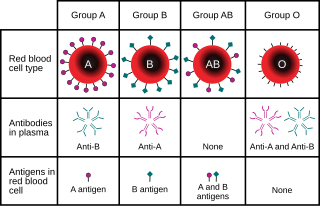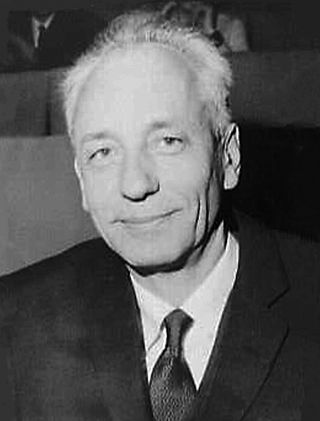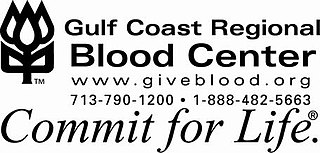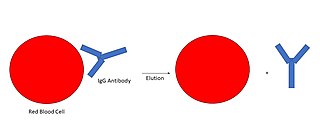
A blood type is a classification of blood, based on the presence and absence of antibodies and inherited antigenic substances on the surface of red blood cells (RBCs). These antigens may be proteins, carbohydrates, glycoproteins, or glycolipids, depending on the blood group system. Some of these antigens are also present on the surface of other types of cells of various tissues. Several of these red blood cell surface antigens can stem from one allele and collectively form a blood group system.

Blood transfusion is the process of transferring blood products into a person's circulation intravenously. Transfusions are used for various medical conditions to replace lost components of the blood. Early transfusions used whole blood, but modern medical practice commonly uses only components of the blood, such as red blood cells, white blood cells, plasma, platelets, and other clotting factors.
Transfusion medicine is the branch of medicine that encompasses all aspects of the transfusion of blood and blood components including aspects related to hemovigilance. It includes issues of blood donation, immunohematology and other laboratory testing for transfusion-transmitted diseases, management and monitoring of clinical transfusion practices, patient blood management, therapeutic apheresis, stem cell collections, cellular therapy, and coagulation. Laboratory management and understanding of state and federal regulations related to blood products are also a large part of the field.

AABB is an international, not-for-profit organization representing individuals and institutions involved in the field of transfusion medicine and biotherapies.

Jean-Baptiste-Gabriel-Joachim Dausset was a French immunologist born in Toulouse, France. Dausset received the Nobel Prize in Physiology or Medicine in 1980 along with Baruj Benacerraf and George Davis Snell for their discovery and characterisation of the genes making the major histocompatibility complex. Using the money from his Nobel Prize and a grant from the French Television, Dausset founded the Human Polymorphism Study Center (CEPH) in 1984, which was later renamed the Foundation Jean Dausset-CEPH in his honour. He married Rose Mayoral in 1963, with whom he had two children, Henri and Irène. Jean Dausset died on June 6, 2009, in Majorca, Spain, at the age of 92.
In ABO hemolytic disease of the newborn maternal IgG antibodies with specificity for the ABO blood group system pass through the placenta to the fetal circulation where they can cause hemolysis of fetal red blood cells which can lead to fetal anemia and HDN. In contrast to Rh disease, about half of the cases of ABO HDN occur in a firstborn baby and ABO HDN does not become more severe after further pregnancies.
The term human blood group systems is defined by the International Society of Blood Transfusion (ISBT) as systems in the human species where cell-surface antigens—in particular, those on blood cells—are "controlled at a single gene locus or by two or more very closely linked homologous genes with little or no observable recombination between them", and include the common ABO and Rh (Rhesus) antigen systems, as well as many others; 44 human systems are identified as of December 2022.

The Ii antigen system is a human blood group system based upon a gene on chromosome 6 and consisting of the I antigen and the i antigen. The I antigen is normally present on the cell membrane of red blood cells in all adults, while the i antigen is present in fetuses and newborns.
Ortho Clinical Diagnostics was an in vitro diagnostics company that made products and diagnostic equipment for blood testing. Ortho served two primary industries in the medical field: clinical laboratories, by producing platforms and assays that test for a variety of diseases, conditions, and substances; and immunohematology, by providing the means to ensure blood transfusion recipients receive appropriate and compatible blood.
Johnson and Johnson acquired Eastman Kodak's Clinical Diagnostics Division in 1994, which was then merged with Ortho Diagnostic Systems in 1997. QuidelOrtho's global corporate offices are in Raritan, New Jersey, while their global research and development center is in Rochester, New York.
Type II hypersensitivity, in the Gell and Coombs classification of allergic reactions, is an antibody mediated process in which IgG and IgM antibodies are directed against antigens on cells or extracellular material. This subsequently leads to cell lysis, tissue damage or loss of function through mechanisms such as
- complement activation via the classical complement pathway
- Antibody-dependent cellular cytotoxicity or
- anti-receptor activity.

Gulf Coast Regional Blood Center is the only blood provider in Houston and its surrounding communities 24 hours a day, 7 days a week. It is one of the largest independent community blood centers in the United States serving 26 counties from the Texas Gulf Coast to Brazos Valley to East Texas. The nonprofit supplies blood to more than 170 hospitals and health care institutions including the Texas Medical Center, the largest medical center in the world. Gulf Coast Regional Blood Center is a proud member of the American Association of Blood Banks (AABB), Blood Centers of America, South Central Association of Blood Banks, Texas Medical Center and America's Blood Centers. Operations started on January 1, 1975, with 64 employees. Today, Gulf Coast Regional Blood Center has over 650 staff members. The overall supervision of Gulf Coast Regional Blood Center's activities is the responsibility of a chief executive officer appointed by the board of trustees. Medical supervision and direction for Gulf Coast Regional Blood Center are provided by a Chief Medical Officer also appointed by the board of trustees.
This page is currently under construction.

Daratumumab, sold under the brand name Darzalex, is an anti-cancer monoclonal antibody medication. It binds to CD38, which is overexpressed in multiple myeloma cells. Daratumumab was originally developed by Genmab, but it is now being jointly developed by Genmab along with the Johnson & Johnson subsidiary Janssen Biotech, which acquired worldwide commercialization rights to the drug from Genmab.
Immunoglobulin therapy is the use of a mixture of antibodies to treat several health conditions. These conditions include primary immunodeficiency, immune thrombocytopenic purpura, chronic inflammatory demyelinating polyneuropathy, Kawasaki disease, certain cases of HIV/AIDS and measles, Guillain-Barré syndrome, and certain other infections when a more specific immunoglobulin is not available. Depending on the formulation it can be given by injection into muscle, a vein, or under the skin. The effects last a few weeks.
The Vel blood group is a human blood group that has been implicated in hemolytic transfusion reactions. The blood group consists of a single antigen, the high-frequency Vel antigen, which is expressed on the surface of red blood cells. Individuals are typed as Vel-positive or Vel-negative depending on the presence of this antigen. The expression of the antigen in Vel-positive individuals is highly variable and can range from strong to weak. Individuals with the rare Vel-negative blood type develop anti-Vel antibodies when exposed to Vel-positive blood, which can cause transfusion reactions on subsequent exposures.
The Junior blood group system is a human blood group defined by the presence or absence of the Jr(a) antigen, a high-frequency antigen that is found on the red blood cells of most individuals. People with the rare Jr(a) negative blood type can develop anti-Jr(a) antibodies, which may cause transfusion reactions and hemolytic disease of the newborn on subsequent exposures. Jr(a) negative blood is most common in people of Japanese heritage.
The Lan blood group system is a human blood group defined by the presence or absence of the Lan antigen on a person's red blood cells. More than 99.9% of people are positive for the Lan antigen. Individuals with the rare Lan-negative blood type, which is a recessive trait, can produce an anti-Lan antibody when exposed to Lan-positive blood. Anti-Lan antibodies may cause transfusion reactions on subsequent exposures to Lan-positive blood, and have also been implicated in mild cases of hemolytic disease of the newborn. However, the clinical significance of the antibody is variable. The antigen was first described in 1961, and Lan was officially designated a blood group in 2012.
The Augustine blood group system is a human blood group system. It includes four red blood cell surface glycoprotein antigens which are encoded by alleles of the gene SLC29A1.

An antibody elution is a clinical laboratory diagnostic procedure which removes sensitized antibodies from red blood cells, in order to determine the blood group system antigen the antibody targets. An antibody elution is deemed necessary when antibodies of the immunoglobulin class G (IgG) are found sensitized (bound) to peripheral red cells collected from a blood product transfusion recipient. IgG antibodies are detected using an assay known as the direct antiglobulin test.








